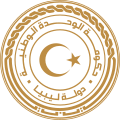Ireland–Libya relations
 From Wikipedia - Reading time: 7 min
From Wikipedia - Reading time: 7 min
 | |
Ireland |
Libya |
|---|---|
Ireland–Libya relations began in 1977. Ireland is accredited to Libya from its embassy in Rome, Italy after closing the embassy in Tripoli due to civil war. Libya is accredited to Ireland from its embassy in London, United Kingdom.
In 2013 Libya planned to open an embassy in Dublin.[1]
Relations under Muammar Gaddafi
[edit]Under Muammar Gaddafi, the prime governor of Libya from 1969 to 2011, relations between both countries were strained due to Gaddafi's support of the Irish Republican Army. Gaddafi was sympathetic to their cause and also wanted revenge for the US Air Force's bombing attacks on Tripoli and Benghazi in 1986.[1][2][3] In late 1987 French authorities stopped a merchant vessel, the MV Eksund, which was delivering a 150-ton Libyan arms shipment to the IRA.[4] When the Troubles were raging in Northern Ireland, three ships of the Irish Naval Service intercepted a ship carrying weapons from Libya which were probably destined for Irish Republican paramilitaries.[5] Between 1984 and 1987 Libya sent the IRA about 1,000 AK47 assault rifles and six tonnes of Semtex explosive alongside other weapons. This shipment ensured The Troubles could continue for many more years, mainly until the Good Friday Agreement of 1998 ended the conflict.[6] In 1976 after a series of bombings by the Provisional IRA, Gaddafi announced that "the bombs which are convulsing Britain and breaking its spirit are the bombs of Libyan people. We have sent them to the Irish revolutionaries so that the British will pay the price for their past deeds".[7]
Beef trade
[edit]Under Charles Haughey the Irish government made trade delegations to ensure that the lucrative beef trade would remain open between the two countries.[8][9][10][11][12]
League of Ireland
[edit]In December 1989, future Ireland manager, Brian Kerr brought a joint St. Patrick's Athletic/Bohemians representative team, travelled to play Al-Ahly in the March 28 Stadium.[13][8][14][15]
First Libyan civil war
[edit]When anti-Gaddafi Libyan rebels took Tripoli in August 2011, the Irish minister for Foreign affairs and leader of the Irish Labour party, Eamon Gilmore urged Muammar Gaddafi to step down as leader of the country. He also said that "Ireland would do all it could to help the reconstruction and redevelopment efforts in the country" and met with representatives of the rebel National Transitional Council and declared that they were the only authority in Libya.[16] After Gaddafi's death, Gilmore said that it brought an end to a "sad and bloody chapter" of Libyan history.[17]
Relations post-Gaddafi
[edit]On the 29th of April 2023, the Dáil Éireann voted in favour of deploying a ship from the Irish navy to enforce a U.N arms embargo (only allowing arms to be given to the Government of National Accord and not Libyan warlords).[2]
On the 4th of April 2024, it was exposed that the Offaly-based company Irish training solutions was giving military training to soldiers (using ex-Irish servicemen) in a Libyan warlord's (Khalifa Haftar) army. This broke the U.N arms embargo agreements. The Irish company had signed a 9 month contract with Haftar and received €300 a day, in return they trained them in sniping, close-quarters combat, and also supplied them with helmets and body armour. The Irish Tánaiste (Micheál Martin) and said that the revelations were "deeply shocking" and the Irish government launched an investigation into the situation.[3][4]
References
[edit]- ^ Genugten, Saskia van (18 May 2016). Libya in Western Foreign Policies, 1911–2011. Springer. p. 139. ISBN 978-1-137-48950-0.
- ^ RTÉ Documentary: The Navy.
- ^ Bowyer Bell, J. (1997). The Secret Army: The IRA. Transaction Publishers. p. 398. ISBN 1-56000-901-2.
- ^ "Libya's 30-year link to the IRA". BBC News. 7 September 2009. Archived from the original on 4 November 2013. Retrieved 18 October 2020 – via Wayback Machine.
- ^ "The Claudia". An Phoblacht. 21 July 2005. Archived from the original on 3 February 2016. Retrieved 18 October 2020.
- ^ "Libyan arms helped the IRA to wage war". Telegraph UK. 4 April 2011. Retrieved 5 February 2016.
- ^ Davis, Brian Lee (1990). Qaddafi, Terrorism, and the Origins of the U.S. Attack on Libya. Bloomsbury Academic. p. 182. ISBN 0-275-93302-4.
- ^ a b Cooney, Gavin (9 December 2019). "New documentary tells tale of how Brian Kerr led a team of Bohs and Pat's players to Gaddafi's Libya". The42.
- ^ Kevin Brannigan (2019). In League with Gaddafi (TV documentary). RTÉ Sport. Event occurs at [time needed].
- ^ "Dictator sent arms to IRA and was supporter of Haughey". Independent.ie. 21 October 2011.
- ^ Coughlan, Martin (27 October 2011). "In the right tent, at the right time". IrishExaminer.com.
- ^ Horne, Marc (22 March 2019). "Ministers built up dossier on Irish links with Libya". TheTimes.co.uk.
- ^ Dodge, John (13 May 2014). "4 Of The Most Interesting Friendlies Involving League of Ireland Sides". Balls.ie.
- ^ Kinsella, Rudi (10 December 2019). "There was a strong reaction to In League With Gaddafi on RTÉ last night". JOE.ie.
- ^ "Foreign tales". VoiceFromTheStand.com. 14 February 2014. Archived from the original on 14 February 2014. Retrieved 18 October 2020 – via Wayback Machine.
- ^ Reilly, Gavan (22 August 2011). "Gilmore: rebel council "now the only authority in Libya"". TheJournal.ie. Retrieved 7 April 2024.
- ^ "Gaddafi death ends 'bloody chapter' in Libya". Irish Examiner. 20 October 2011. Retrieved 7 April 2024.
 KSF
KSF
